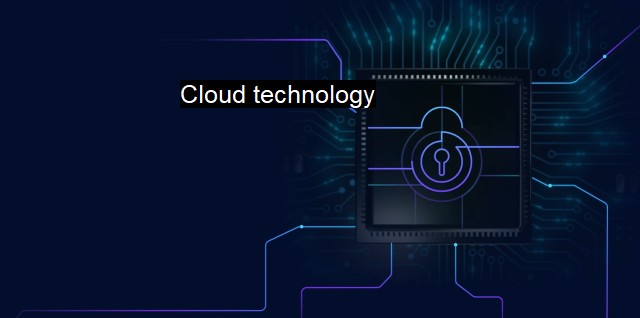What is Cloud technology?
The Transformational Power of Cloud Technology: Revolutionizing Business Operations, Improving Efficiency, and Mitigating Cybersecurity Risks
Cloud technology refers to the provision of computing services over the Internet. It is the delivery of computing services such as virtual storage, servers, applications, and databases over the internet. This technology allows users, regardless of their geographic location, to access applications and information on demand, without having to store it on local servers, thus providing agility and flexibility. Cloud technology has transformed the way businesses operate, as more companies can now leverage its benefits to reduce costs, improve efficiency and productivity, increase business continuity and resilience.Cloud technology enables businesses to be more agile and flexible by providing easy and instant access to information, which can be done through any device that has internet access. It also allows a large number of employees to work together online, share resources and collaborate in real-time, which leads to faster project delivery. The appeal of the cloud also lies in its scalability, which allows businesses to expand and contract their computing resources based on functionality, storage requirements, and other factors.
As businesses adopted cloud technologies, it has raised new challenges and opportunities to cybersecurity. Cloud computing has become more attractive to cyber-criminals for the opportunities it provides to target sensitive data, either through exploiting vulnerabilities in cloud infrastructure or conducting a spear-phishing campaign targeting cloud server credentials. Cloud manufacturers and users have a shared responsibility to keep the cloud secure. This is the reason why cybersecurity and antivirus have evolved at the same pace as the cloud.
One of the main advantages that security providers have due to the cloud’s dynamic nature is that imminent threats can be tracked over large data sets and precise security strategies to be taken in coming days and weeks. Security services track data provided a higher increase with relation to large protected data items, increasing (up to terabytes per minute); that information can be used to segregate routine/proactive efficiency, identifying cyberattack methods through several IP addresses.
This increased awareness is essential when looking into defensive security kinds outside around sites independently. Seeking outside vulnerabilities is punishable by hacker groups and state-run enemies, companies would be vulnerable to a string of security breaches if cloud technology firms were looped into any entry points to their confidential files. Insisting on having practices like compartmentalising the most secretive of infrastructures from “open” locations such as email clients, customer’s systems, and even backup technologies will increase whole defensive stability.
Cloud technology is an excellent investment, with the advantage of protecting software, hardware, and internal IT services against attacks with the added advantage of preserving continuity when facing cyber criminals in what seems an ongoing attack on this entire market sector. Cloud technologies provide flexibility and agility, which is required in today's business environment, but businesses also need to implement cutting-edge cybersecurity and antivirus technologies to augment system resilience.
The cloud is transforming how businesses operate, and in many cases becomes an essential competitive differentiator. it does not come without its risks, making the role of cybersecurity and antivirus central to compliance with regulatory requirements. By embracing sound data governance and employing advanced security tools and focused cybersecurity professionals, businesses Operating in the cloud will have excellent chances of mitigating risks and keeping their proprietary applications, service offerings and sensitive information safe.

Cloud technology FAQs
What is cloud technology?
Cloud technology is a method of storing, managing, and processing data through the internet instead of using physical servers or devices. It allows users to access their data and applications from anywhere with an internet connection, making it a flexible and scalable solution for businesses.What are the benefits of using cloud technology for cybersecurity?
Cloud technology offers several benefits for cybersecurity, including centralized monitoring and management of security measures, faster threat detection and response, and scalability to handle increasing amounts of data and users. It also allows for easier collaboration and sharing of threat intelligence across teams and organizations.Is cloud technology secure for storing sensitive data?
Cloud technology can be secure for storing sensitive data if proper security measures are in place. This includes using encryption, access controls, and monitoring tools to protect data from unauthorized access, as well as regularly updating and patching software to address vulnerabilities. It's important to choose a reputable cloud provider with a strong track record in security and compliance.How can antivirus software be integrated with cloud technology?
Antivirus software can be integrated with cloud technology by using cloud-based antivirus solutions that are hosted and managed by a provider. These solutions allow for real-time scanning and threat detection across multiple devices and locations, providing better protection against evolving threats. They also offer centralized management and reporting, making it easier to monitor and maintain antivirus protections. External Resources
| | A | | | B | | | C | | | D | | | E | | | F | | | G | | | H | | | I | | | J | | | K | | | L | | | M | |
| | N | | | O | | | P | | | Q | | | R | | | S | | | T | | | U | | | V | | | W | | | X | | | Y | | | Z | |
| | 1 | | | 2 | | | 3 | | | 4 | | | 7 | | | 8 | | |||||||